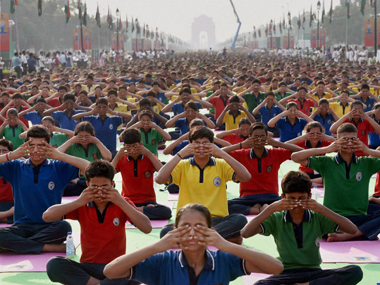Yoga, a traditional practice which aims at bringing together physical and mental well-being, has got global recognition in recent times. In 2015, the
United Nations
unanimously declared 21 June to be International Day of Yoga. Here is a look at how prominent people have described the benefits of yoga. BKS Iyengar Bellur Krishnamachar Sundararaja Iyengar, popularly known as BKS Iyengar, was the founder of the style of modern yoga known as “Iyengar Yoga” is often referred to as “the father of modern yoga”.
“The only difference between now and the early days is that in the early days I was like all other youngsters. I was tempted to do the asana one after the other. Today, I stay in Dwi Pada Viparita Dandasana or in Kapotasana for quite a length of time. At this age I clearly understand the sutra, sthira, sukham, asanam in its total sense. Now, I see in each asana, the perfect freshness and firmness of body, the alert, steadiness of intelligence and the sweet, benevolence of the self. I see whether I can enjoy sthira and sukha in a long stay in Kapotasana. Can I be sthira and sukha in Dwi Pāda Viparita Dandasana?
Swami Vivekananda If one had to trace yoga’s journey in the West, we would have to start from 11 September, 1893, when Swami Vivekananda made his famous speech at Chicago in the Parliament of religions. The oratory skills of Vivekananda on Indian religious traditions, immediately won him accolades.
Vivekananda is known to have said, “Meditation can turn fools into sages but unfortunately, fools never meditate.”
Swami Kripalu Swami Kripalu, a yogi with an inquisitive mind, had explored every facet of the traditional practice. During his lifetime, he generated a large body of teachings that fall into two major categories – a universal set of teachings encouraging everyone to cultivate personal health, well-being, and a virtuous character; and a set of teachings for serious aspirants desiring to study yoga.
He had said, “Truly, the wise proclaim that love is the only path … and the only scripture.”
TKV Desikachar Born in 1938, TKV Desikachar was the son of the great yoga master Sri Tirumalai Krishnamacharya. Although as a child, Desikachar found hatha yoga boring, he began formal training with his father in his 20s, shortly after completing his BSc in engineering. Drawing on his father’s teachings, Desikachar went on to develop Viniyoga, a highly individualised approach to yoga that nurtures the practice to each student’s specific physical condition, emotional state, age, cultural background, and interests.
“Yoga is basically a program for the spine at every level—physical, respiratory, mental, and spiritual,” said Desikachar.
Rabindranath Tagore The author of Gitanjali and a Nobel laureate in Literature, Rabindranath Tagore’s poetry was viewed as spiritual and mercurial while, his prose “elegant”.
“The meaning of our self is not to be found in its separateness from God and others but, in the ceaseless realisation of yoga, of union,” Tagore said.
)